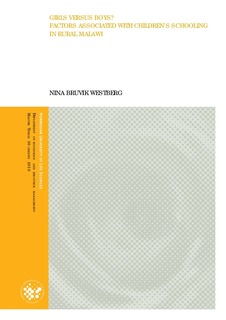| dc.description.abstract | The decision on whether to send children to school or not is essentially one made by the household. Recent research has increasingly focused on how intra-household bargaining affects the school participation decision, and with special focus on the mother’s position relative to the father. In this thesis I have sought to identify factors affecting children’s schooling, with special focus on child’s gender, parents’ role and preferences and how the school participation outcome may be resource constrained.
I hypothesized that parents’ education levels are positively related with children’s schooling, but that special treatment is given to children of same gender as themselves. I employed three school outcome measures in order to capture the multiple entry points of influence: the probability of annual school participation, likelihood of delayed school progression and probability of dropping out of primary school. I found in general supporting evidence on behalf of mothers’ positive effect, although evidence of gender-based preferential treatment in terms of girls’ school progression. Regarding fathers’ influence the results were mixed, showing a positive relationship in terms of girls’ school attendance and boys’ school progression, the latter indicating preferential bias to boys; whereas girls’ primary school continuation or completion was negatively affected.
I hypothesized that children’s schooling would be positively affected by residing in a female-headed, given women’s stronger bargaining position; but also that the ability to follow up on these preferences may be resource constrained. Using the three outcome measures I found some support for the latter hypothesis, and for girls especially, although the evidence is empirically weak.
The ability to follow up on preferences may hold for other households as well. I therefore further hypothesized that poverty and labour constraints, the latter also encompassing gender-based labour constraints, deter children’s schooling. Using two Logit models, controlling for random-and fixed-effects at household and individual level, I investigated the ability to follow up on preferences for sending children to school. I found supporting evidence for presence of poverty constraints when controlling for random effects, although weak evidence for girls. In terms of labour constraints the evidence was mixed, in part suggesting a rejection of my stated hypotheses.
The dominant inheritance system and residential location may affect internal bargaining power. In order to investigate this I hypothesized that a child’s school progression would be negatively affected when both the residential location and the predominant inheritance system in the area had an opposite gender focus than the sex of the child. Using Logit models I found that boys’ school progression was likely to be negatively affected by residing matrilocally within a matrilineal society as opposed to patrilocal residence in a patrilineal society; whereas girls’ school progression was positively affected by residing patrilocally within a matrilineal society as opposed to in a patrilineal society. Whether the results are a question of regional bias or different perceived investment returns to children’s schooling is uncertain.
Overall poverty alleviation seems to be the centre point in improving children’s schooling outcomes, whereas the role of land and education in bargaining deserves further scrutiny. | no_NO |
